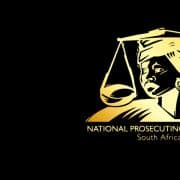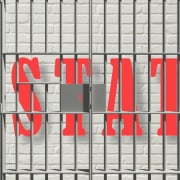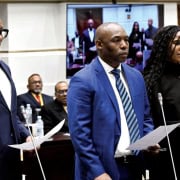|
Getting your Trinity Audio player ready...
|
Image: Flickr/GovernmentZA
Used under a Creative Commons Attribution-NoDerivs 2.0 Generic license
A mere two weeks after he was expelled from the ANC following decades in its leadership ranks, Ace Magashule is reportedly pursuing a ‘moonshot pact’, liaising with some opposition parties and looking for a new political home.
Magashule held the powerful position of secretary-general of the governing party before being suspended in May 2021 by the party’s disciplinary committee for violating the ANC constitution. He was the ANC provincial chairperson in the Free State for 10 years prior to assuming the national role.
His expulsion means that when he returns to the Bloemfontein High Court in April 2024 for the start of the state capture-linked case that he was arrested for in 2021, Magashule will be without any protection from the party.
His lengthy suspension is viewed by some inside and outside the party as a means to disempower and alienate him from the rest of the leadership. This is in a context where the ANC has notoriously kept several of its leaders named in the state capture commission’s report, in positions of seniority in both the party and government, despite clouds of negativity. This is also despite recommendations from commission chairperson Chief Justice Raymond Zondo that they be criminally investigated to establish whether or not allegations so far made against them could be proved.
Mineral resources and arts and culture ministers, Gwede Mantashe and Zizi Kodwa respectively, have retained cabinet posts despite Zondo having recommended that they face further investigation for their association with companies that held lucrative contracts with the state.
Fall from grace
Magashule’s own fate, however, has not been as positive. The state capture commission was a hallmark of his fall from grace, with a substantial amount of evidence, some of it circumstantial, levelled against him. Zondo also recommended that he be criminally investigated over irregularities that emerged about his 10-year term as premier, particularly in relation to the Estina dairy farm project that lost government over R200-million for work not completed.
Fellow provincial ANC leader and now premier, Mxolisi Dukwana, declared Magashule unfit for public office during his appearance before the commission in 2019. Dukwana’s testimony not only relied on hearsay implicating Magashule in interference in procurement, but also included his personal accounts of him accompanying Magashule to meetings with members of the Gupta family or their associates.
Evidence before the commission that centred around governance in the Free State implicated Magashule to one degree or other – from the Vrede dairy farm evidence that unveiled irregular procurement practices favouring Gupta-linked companies, to the low cost housing corruption evidence in which Zondo found that provincial and national guidelines were ignored in pursuit of a rushed exercise in 2011, and also what has been dubbed the “asbestos” scandal.
Dodgy wheeling and dealing
Zondo stated in his final report on matters related to the Free State that Magashule was served with notice of Dukwana’s impending appearance and his implication of him, but that he never filed an affidavit to refute the allegations made. He did, however, threaten Dukwana with legal action, but this played out outside the commission’s processes.
Incidentally, Magashule had publicly declared a year earlier, in 2018, that he was prepared to appear before the commission to dispel the perception of captured ANC leaders. Following Dukwana’s revelations, and further testimonies of other witnesses in relation to Free State matters, Magashule has since been criminally charged for what the National Prosecuting Authority believes is his part in the R255-million failed asbestos project.
The project, which the commission heard was first proposed in an unsolicited bid by a joint venture between companies owned by co-accused Edwin Sodi and his late business partner Ignatius Mpambani, was awarded at the above cost to the provincial department of human settlements. This was only months after Blackhead Consulting and Diamond Hill delivered the proposal, claiming to seek to conduct an audit and eradication of all asbestos roofing in houses across the Free State’s townships. This proposal was allegedly made to Magashule, with whom Mpambani had a long-standing association.
Only one portion of this work was allegedly done, by a sub-contractor appointed by the joint venture’s own sub-contractor, an arrangement which later became the subject of litigation in the province. It was only after the Public Protector probed the matter that payments to the joint venture were stopped, some R230-million later, in 2020. Among the officials charged alongside Magashule and Sodi is the head of the department, Nthimotse Mokhesi.
The trio and their nine co-accused – which include entities linked to the contract – will have their day in court in the high profile case in April 2024. Around the same timeframe, the country will most likely be holding its national and provincial elections, which may explain Magashule’s response to his expulsion of seeking an alternative political home.
He has also lashed out at President Cyril Ramaphosa as leading the purge against him, at the behest of businessman Johan Rupert, furthering the narrative of an ANC faction that the president is a puppet of “white monopoly capital”.
Magashule’s attempt to get the corruption case against him dismissed also backfired, with the Bloemfontein High Court finding that his assertion that a charge in terms of the Prevention and Combating Corrupt Activities Act did not apply to him in his capacity as former capacity as premier because he was not an accounting officer, was invalid.
As he gradually drifts further and further away from the political protection of his party, Magashule faces tough times in proving his political detractors wrong and navigating the course of the damage a criminal case is likely have on his brand.






